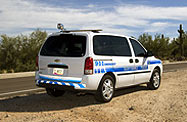10/1/2008
Maryland, Missouri, Tennessee Explore Freeway Speed CamerasFederal Highway Administration and Illinois governor urge Maryland, Missouri and Tennessee to use freeway speed cameras.

Officials from Maryland, Missouri and Tennessee joined Illinois Governor Rod R. Blagojevich (D) at a two-day event designed to promote the use of speed cameras on freeways throughout the country. In 2006, Illinois became the first state government to implement a statewide photo ticketing program. This effort was soon copied by Arizona, Colorado and Washington state, each of which also sent participants to yesterday's "highway safety workshop." Officials attending heard about how successful these programs have been at imposing automated tickets worth up to $1000 each.
"One of the keys to this success has been the photo speed enforcement vans that have deployed by IDOT and the Illinois State Police," Blagojevich said in a prepared statement about the event.
The participation of Missouri and Tennessee officials has revealed their states' interest in using automated ticketing machines on freeways.
Although Illinois currently uses photo radar vans only in highway work zones, Blagojevich is working on legislation that would lift all restrictions and authorize deployment on every freeway in the state. The governor first sold the program as essential to "protecting highway workers." Now that the program is in place, it is a simpler legislative task to expand its scope. This strategy, however, did not work for Maryland Governor Martin O'Malley (D). Squabbling between state and local lawmakers regarding distribution of profits from a work zone camera program sunk a proposal that had passed both the state House and Senate earlier this year -- despite lavish lobbying efforts by Affiliated Computer Services (ACS), the private company in charge of the Illinois program. Connecticut's governor also failed in efforts to convince state lawmakers to approve freeway speed cameras.
Blagojevich is especially desperate to expand the program beyond work zones because experience has shown that lowered ticket fines issued at a higher volume would generate much more revenue. A Chicago Tribune investigation found that Cook County judges have been unwilling to uphold the state's pricey $375 automated fines for a first offense and $1000 with 90-day license suspension for the second. Despite issuing 3478 tickets in the county with a face value of at least $1,304,250, the state ended up pocketing a small fraction of this amount. More than half of the fines were thrown out entirely, often because photos did not clearly identify the driver -- a necessary step because these tickets also carry license points. In the remaining cases, judges refused to impose the massive fines on all but five percent of ticket recipients.
Although Illinois officials insist their primary interest has always been to protect workers from accidents caused by speeding drivers, studies show that only 15 percent of freeway construction zone injuries are actually caused by automobiles. The vast majority of work zone "vehicle" accidents were found to involve workers injured by their own construction equipment. An unreleased 2005 UK Department for Transportation report showed that the use of conventional speed cameras in construction zones caused a 55 percent increase in collisions.


